Monday, September 28th 2020

NVIDIA AIC Partners Clarify RTX 3080/3090 Crash to Desktop Issues, Capacitor Choices
(UPDATE 28SEPT 16H31 GMT: Updated the MSI section with changes in the RTX 3080 Gaming X Trio store page).
Compounding the limited availability with the crash to desktop issues users have been experiencing with NVIDIA's recent RTX 3080/3090 graphics cards have led to rivers of digital ink being run on NVIDIA's latest RTX-30 series. After we've reported on NVIDIA's PG132 "Base Design" and manufacturer-specific capacitor choices and circuitry, we've now seen many of NVIDIA's AIC partners actually respond to this issue, clarifying their choices in this specific part of RTX 30-series board design, as well as the steps they've taken (if any) so as to help solve the issues (which are thus confirmed as being somewhat related to these capacitor choices, even if they are not the root cause.)Some AICs have spoken out regarding this issue, saying that their cards have no issues; others clarified that there were indeed verifiable problems in some of their early board designs due to absence of MLCC (Multilayer Ceramic Chip Capacitors), which are more capable of filtering high frequencies than POSCAPs/SP-CAPs are (although these do have some other characteristics that make them desirable for this task). NVIDIA, however, still haven't issued a statement on this issue, even though there are some reports of RTX 3080 FE cards crashing as well. Problems may arise in insufficient broadband frequency cleanup at high operating frequencies (2 GHz+) for GA-102 GPUs. These problems seem somewhat alleviated in boards featuring MLCC components on their design, though this doesn't mean they are automatically immune or that this is the root of the problem (word is running that this might be caused by overzealous Boost algorithms leading chips to error-prone operating frequencies, but there is no evidence on any of this as of yet). Partners' responses are shared after the break, organized by manufacturer.
ASUS
ASUS was one of the manufacturers to ship a fully MLCC capacitor design with their Strix Gaming OC graphics cards, and haven't issued a statement yet. The company supposedly detected problems in this area while internally testing the RTX 30-series, and chose to do away with any POSCAP/SP-CAP in their highest-tier designs.COLORFUL
The manufacturer was the first to report on an issue to the press. Review samples that had already been sent out, were later recalled.
EVGA
MSI acknowledged the issue during the MSI Insider Livestream, suggested it could be a driver issue. In our in-depth review, we found that MSI uses a single set of 10 MLCC capacitors and 5 POSCAPs/SP-CAPs in their design.UPDATE SET 28th 16H31 GMT: MSI have reportedly quietly updated their RTX 3080 Gaming X Trio product page, indicating that an engineering change has been done to their boards' design. While previously MSI's own photos of the circuitry on the back of the cards' PCSB only showed a 5x POSCAP/SP-CAP and 1x MLCC array design (you can see this exact design in our review of the MSI RTX 3080 Gaming X Trio), the new product page images now feature an updated 4x POSCAP/SP-CAP and 2x MLCC array design, exactly like the one in NVIDIA's FE. This change was done silently, and it likely means new revisions of the cards are already shipping.
I write reportedly, because when one loads up MSI's product page for the RTX 3080 Gaming X Trio, the picture of the back of the PCB is now no longer available. However, the same picture is available in the company's RTX 3090 Gaming X Trio graphics card, which already featured this 4x POSCAP/SP-CAP and 2x MLCC design. In fact, MSI has now removed the backplate photograph in all of their RTX 3080 products.ZOTAC
ZOTAC is the only AIC we've reviewed a card from who employs a full 6x POSCAP/SP-CAP solution, absent of any MLCC capacitor array. The company on Twitter said that they are investigating the issue, and promise to keep in touch with all RTX 30-series buyers who experience any issues.
Sources:
ZOTAC @ Facebook, jacob Freeman @ EVGA Forums, GALAX @ Weibo, GAINWARD @ Weibo, via Videocardz, via Videocardz
Compounding the limited availability with the crash to desktop issues users have been experiencing with NVIDIA's recent RTX 3080/3090 graphics cards have led to rivers of digital ink being run on NVIDIA's latest RTX-30 series. After we've reported on NVIDIA's PG132 "Base Design" and manufacturer-specific capacitor choices and circuitry, we've now seen many of NVIDIA's AIC partners actually respond to this issue, clarifying their choices in this specific part of RTX 30-series board design, as well as the steps they've taken (if any) so as to help solve the issues (which are thus confirmed as being somewhat related to these capacitor choices, even if they are not the root cause.)Some AICs have spoken out regarding this issue, saying that their cards have no issues; others clarified that there were indeed verifiable problems in some of their early board designs due to absence of MLCC (Multilayer Ceramic Chip Capacitors), which are more capable of filtering high frequencies than POSCAPs/SP-CAPs are (although these do have some other characteristics that make them desirable for this task). NVIDIA, however, still haven't issued a statement on this issue, even though there are some reports of RTX 3080 FE cards crashing as well. Problems may arise in insufficient broadband frequency cleanup at high operating frequencies (2 GHz+) for GA-102 GPUs. These problems seem somewhat alleviated in boards featuring MLCC components on their design, though this doesn't mean they are automatically immune or that this is the root of the problem (word is running that this might be caused by overzealous Boost algorithms leading chips to error-prone operating frequencies, but there is no evidence on any of this as of yet). Partners' responses are shared after the break, organized by manufacturer.
ASUS
ASUS was one of the manufacturers to ship a fully MLCC capacitor design with their Strix Gaming OC graphics cards, and haven't issued a statement yet. The company supposedly detected problems in this area while internally testing the RTX 30-series, and chose to do away with any POSCAP/SP-CAP in their highest-tier designs.COLORFUL
The manufacturer was the first to report on an issue to the press. Review samples that had already been sent out, were later recalled.
EVGA
Recently there has been some discussion about the EVGA GeForce RTX 3080 series.GAINWARD
During our mass production QC testing we discovered a full 6 POSCAP solution cannot pass the real world applications testing. It took almost a week of R&D effort to find the cause and reduce the POSCAPs to 4 and add 20 MLCC caps prior to shipping production boards, this is why the EVGA GeForce RTX 3080 FTW3 series was delayed at launch. There were no 6 POSCAP production EVGA GeForce RTX 3080 FTW3 boards shipped.
But, due to the time crunch, some of the reviewers were sent a pre-production version with 6 POSCAP's, we are working with those reviewers directly to replace their boards with production versions.
EVGA GeForce RTX 3080 XC3 series with 5 POSCAPs + 10 MLCC solution is matched with the XC3 spec without issues.
Also note that we have updated the product pictures at EVGA.com to reflect the production components that shipped to gamers and enthusiasts since day 1 of product launch. Once you receive the card you can compare for yourself, EVGA stands behind its products!
— Jacob Freeman, EVGA Forums
Announcement on SP-CAP Capacitors and MLCC Capacitors of Gainsun 30 Series Graphics Card ProductsGALAX
Dear Gainward consumer players:
Thanks to the friends who bought and supported Gainward. Recently, we received the voice of market players' inquiries. Many players are very concerned about our company's just released 30 series products. Regarding the specific usage of the capacitors on the back of the chip, we hereby explain the situation:
All the RTX 3080 10 GB graphics cards released by Gainward currently use 5 SP-CAP capacitors on the back of the chip and 10 MLCC capacitors. The versions currently on the market are all the original commercial versions.
All the RTX 3090 graphics cards released by Gainward currently use 4 SP-CAP capacitors on the back of the chip and 20 MLCC capacitors. The versions currently on the market are all the original commercial versions.
As a long-term AIC partner of Nvidia, Gainward has always been adhering to the product standard to design and produce completely according to Nvidia's requirements. Therefore, currently players are concerned about the problem of capacitors and new product failures on the Internet. Currently Gainward has not generated such feedback..
In addition, all Gainward graphics card products support three-year warranty and personal warranty service. Thank you consumers and players for your support and love to Gainward.
(automatic translation from Chinese)
About the SP-CAP capacitors and MLCC capacitors of GALAXY RTX 3080/3090 productsINNO3DMSI
Dear player friends:
Hello, everyone. Recently, many users have come to inquire about the specific usage of the capacitors on the back of the GALAXY RTX 3080/3090 series of graphics chips. After verification, about the RTX 3080/3090 released by GALAXY. The capacitors used on the back of the model chip are as follows:
1. GALAXY RTX 3080 Heijiang/Metal Master product, the number of SP-CAP capacitors on the back of the chip: 5, the number of MLCC capacitors: a set of 10. This version is currently on sale and is the original commercial version.
2. GALAXY RTX 3090 General/Metal Master product, the number of SP-CAP capacitors on the back of the chip: 4, the number of MLCC capacitors: two groups of 20. This version is currently on sale and is the original commercial version.
3. GALAX RTX 3090 GAMER trial production samples, currently only 6 pieces are in the hands of the media and KOL. The first batch of this sample uses 6 SP-CAP capacitors. After confirmation, the GAMER products officially produced and sold will be used for capacitor materials. Make optimization improvements. Note: This product is not currently on sale.
I am very grateful to the players and friends for their support and love to GALAXY. GALAXY is also consistent in its pursuit of product quality. It is our glorious mission to provide you with better and stronger hardware. In addition, the current full range of GALAXY graphics card products support three-year warranty and personal warranty service. If you have other doubts or questions, please feel free to leave us a message to discuss, thank you!
(automatic translation from Chinese)
MSI acknowledged the issue during the MSI Insider Livestream, suggested it could be a driver issue. In our in-depth review, we found that MSI uses a single set of 10 MLCC capacitors and 5 POSCAPs/SP-CAPs in their design.UPDATE SET 28th 16H31 GMT: MSI have reportedly quietly updated their RTX 3080 Gaming X Trio product page, indicating that an engineering change has been done to their boards' design. While previously MSI's own photos of the circuitry on the back of the cards' PCSB only showed a 5x POSCAP/SP-CAP and 1x MLCC array design (you can see this exact design in our review of the MSI RTX 3080 Gaming X Trio), the new product page images now feature an updated 4x POSCAP/SP-CAP and 2x MLCC array design, exactly like the one in NVIDIA's FE. This change was done silently, and it likely means new revisions of the cards are already shipping.
I write reportedly, because when one loads up MSI's product page for the RTX 3080 Gaming X Trio, the picture of the back of the PCB is now no longer available. However, the same picture is available in the company's RTX 3090 Gaming X Trio graphics card, which already featured this 4x POSCAP/SP-CAP and 2x MLCC design. In fact, MSI has now removed the backplate photograph in all of their RTX 3080 products.ZOTAC
ZOTAC is the only AIC we've reviewed a card from who employs a full 6x POSCAP/SP-CAP solution, absent of any MLCC capacitor array. The company on Twitter said that they are investigating the issue, and promise to keep in touch with all RTX 30-series buyers who experience any issues.

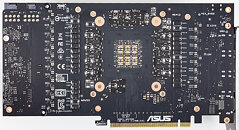
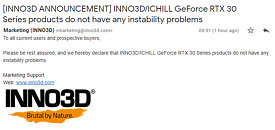
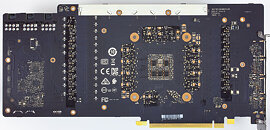
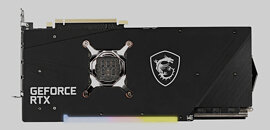
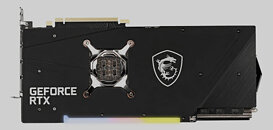
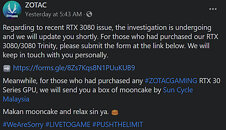
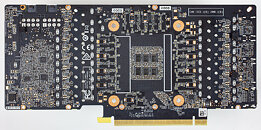
77 Comments on NVIDIA AIC Partners Clarify RTX 3080/3090 Crash to Desktop Issues, Capacitor Choices
Man I bet that if AMD were to gain considerable market share one day AIBs will run screaming away from Nvidia.
A friendly reminder to all the fanboys: this only happens when overclocking, and overclocking is not guaranteed, in fact overclocking is warranty-voiding, so there really isn't any cause for blaming NVIDIA or its AIBs, so put away your pitchforks and threats of lawsuits.
Is this bad form and rushed launch by NVIDIA? Yes, and they should be blamed for that. But don't blame them for overclocks that aren't stable, because they never promised the cards would be stable at anything but stock base/boost.
Or are you talking manual Oc.
Either way I don't recall seeing much proof of anything anyway so shouting out or against blame is a bit ahead of things IMHO.
With Nvidia's lack of discourse on the topic I'm happy to see how it pans out before allocating blame.
Don't much concern me but defensive posturing for a massive company that could easily release PR debating their own blame is ridiculous.
www.world-today-news.com/rog-strix-radeon-rx-5700-xt-asus-refers-to-amd-in-case-of-temperature-problems/
Now AIBs disregarded Nvidia recommendations and its Nvidia's fault ? sounds like hypocrisy to me.
There are loads of videos detailing the differences between FE cards vs the AIBs and debunking the problem as soon as the word spread that cards were crashing.
Not that ive seen. Basically Jayz2cents, HWunboxed, GamersNexus, der8auer and a few others have come out and debunked it and pointed out the differences and where the problem was coming from.
None of them mentioned problems with the FE, Infact a few of them were saying the FE cards were even overbuilt.
::EDIT::
Also Panasonic are Sanyo's parent company.
::EDIT 2::
Ok -- I take that back. I watched HWunboxed recent video where they were saying it also happend with FE cards. Though they cant replicate the crashes. At first they thought it was a hardware issue then it turned out to be a possible driver issue because they cant replicate the crashes consistently - crashes are always all random. However they did iterate that with Zotac cards it was 100% a hardware issue due to the caps on the cards and Zotac have acknowledged the issue.
INNO3D must be in the same boat.
Nvidia doesn't guaranty anything over 1710 MHz (if I remember correctly the frequency).
"this only happens when overclocking"
No, you are not privvy to the problems that everyone is having with their cards so this reeks like a desperate defence again. What is your aim in trying to sweep it under the carpet, honestly?
Some folks just wanna be angry for the sake of being angry. Let it be.
tl;dr: four cards were tested:
- FE RTX 3080
- ASUS TUF OC RTX 3080
- Gigabyte Gaming OC RTX 3080
- Zotac Trinity (non-OC) RTX 3080
All four were stable at stock, all four experienced crashing when oc to over 2ghz, Zotac Trinity experienced more instability than the others at this frequency.
Paul presented some good data to look at. I bet our own @W1zzard also would have caught this in his wide range of review samples when attempting overclocking. After all W1zzard reported OC on all the GPU tests.
So what we see so far is when OCed pass 2GHz, most cards have this CTD happen. CTD is likely due to frequency too high but one really need to look at Nvidia's error log file to check what specific rendering stage did this happen.
Is this issue annoying? You bet
Is this issue bad for consumers? Definitely
Is this issue blown out of proportion? Yep
Issue identified and responded within a week, the AIBs are taking it seriously. And I would bet AIBs wont dare say much unless OKed by Nvidia to do so.
So put your pitch forks down angry mobs, 2020 isn't over yet and you will have plenty of oppotunity to be mad at something.